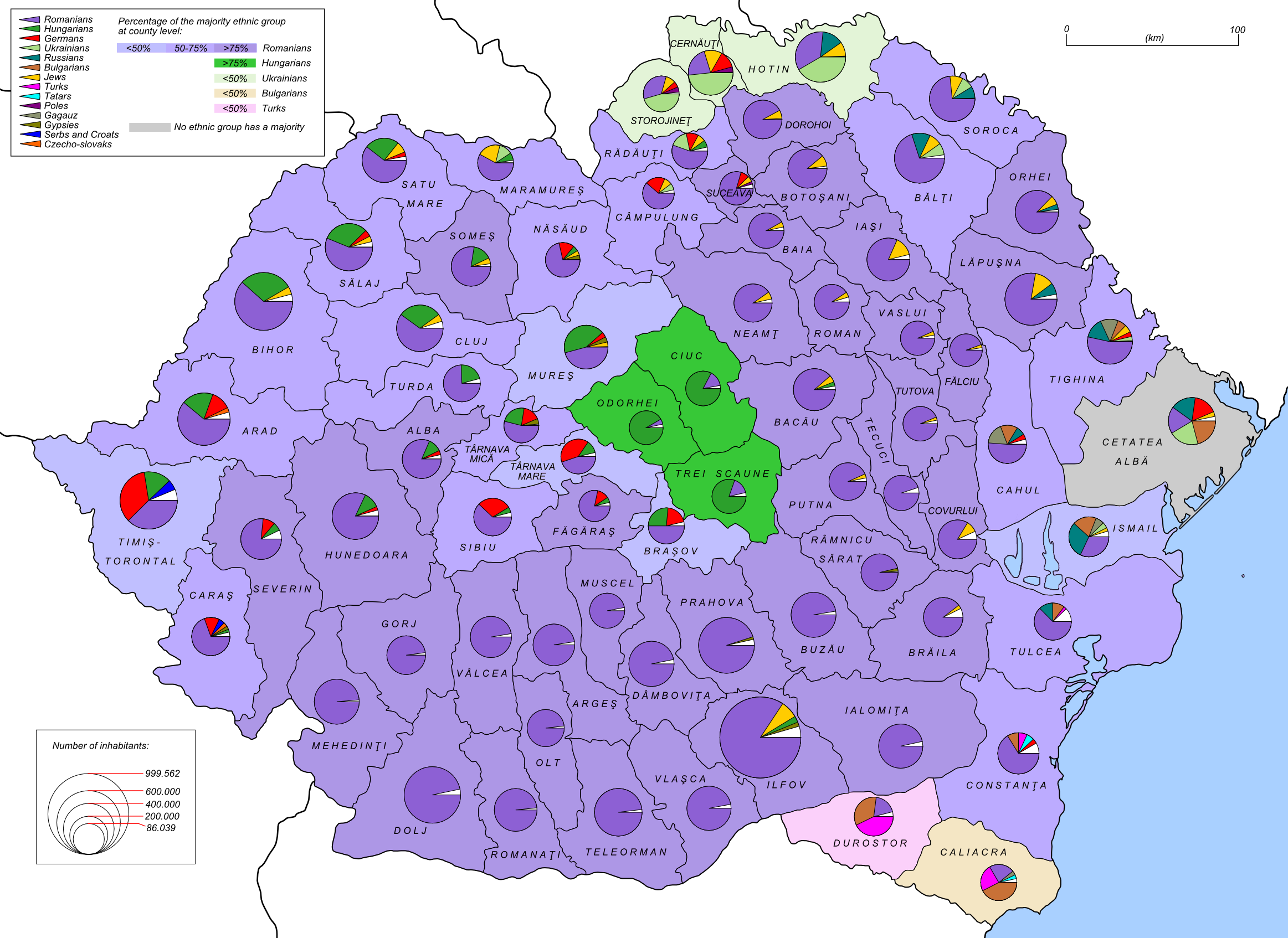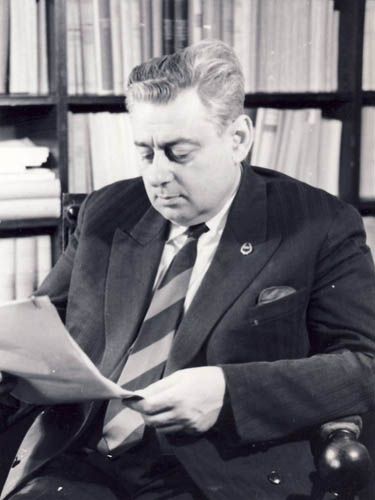|
Leonte Tismăneanu
Leonte Tismăneanu (born Leonid Tisminetski, or Tisminețki; 1913–1981) was a Romanian communist activist and propagandist. Born into a Jewish family in Soroca, Bessarabia, Russian Empire (now in Moldova),Badin he joined the Romanian Communist Party (PCR) in the early 1930s. He engaged in illegal communist activities in Bucharest, Galaţi, Brăila and Soroca. Later, he fought as a volunteer in the International Brigades during the Spanish Civil War, losing his right arm at the age of 24. In 1939, Tisminetski left for the Soviet Union, where he became a student of the Moscow State Linguistic University. After the start of Operation Barbarossa, in which Romania took part (''see Romania during World War II''), he worked with Ana Pauker, Leonte Răutu, and Vasile Luca for the Romanian language branch of Radio Moscow, first as a newsreader, then as a writer. In 1948, Tisminetski and his family were sent to Soviet-occupied Romania, where he changed his name in 1949 to ''Leonte T ... [...More Info...] [...Related Items...] OR: [Wikipedia] [Google] [Baidu] |
Leonid Tisminețki (Leonte Tismăneanu), Siguranța Mug Shot
Leonid (russian: Леонид ; uk, Леонід ; be, Леанід, Ljeaníd ) is a Slavic version of the given name Leonidas. The French version is Leonide. People with the name include: *Leonid Andreyev (1871–1919), Russian playwright and short-story writer who led the Expressionist movement in the national literature *Leonid Brezhnev (1906–1982), leader of the USSR from 1964 to 1982 *Leonid Buryak (b. 1953), USSR/Ukraine-born Olympic-medal-winning soccer player and coach *Leonid Bykov (1928–1979), Soviet and Ukrainian actor, film director, and script writer *Leonid Desyatnikov (b. 1955), Soviet and Russian opera and film composer *Leonid Feodorov (1879–1935), a bishop and Exarch for the Russian Catholic Church, and survivor of the Gulag *Leonid Filatov (1946–2003), Soviet and Russian actor, director, poet, and pamphleteer *Leonid Gaidai, (1923–1993), Soviet comedy film director *Leonid Geishtor (b. 1936), USSR (Belarus)-born Olympic champion Canadian pairs spri ... [...More Info...] [...Related Items...] OR: [Wikipedia] [Google] [Baidu] |
Romania During World War II
Following the outbreak of World War II on 1 September 1939, the Kingdom of Romania under King Carol II officially adopted a position of neutrality. However, the rapidly changing situation in Europe during 1940, as well as domestic political upheaval, undermined this stance. Fascist political forces such as the Iron Guard rose in popularity and power, urging an alliance with Nazi Germany and its allies. As the military fortunes of Romania's two main guarantors of territorial integrity—France and Britain—crumbled in the Fall of France (May to June, 1940), the government of Romania turned to Germany in hopes of a similar guarantee, unaware that the then-dominant European power had already granted its blessing to Soviet claims on Romanian territory in a secret protocol of 1939's Molotov–Ribbentrop Pact. In the summer of 1940 diplomacy resolved a series of territorial disputes in a manner unfavorable to Romania, resulting in the loss of most of the territory gained in the wake ... [...More Info...] [...Related Items...] OR: [Wikipedia] [Google] [Baidu] |
Alexandru Graur
Alexandru Graur (; July 9, 1900 – July 9, 1988) was a Romanian linguist. Born into a Jewish family in Botoșani, Graur graduated from the Faculty of Letters of the University of Bucharest and the École Pratique des Hautes Études in Paris (1924–1929). He obtained a Doctor of Philosophy degree from the Sorbonne. After returning to Bucharest, he became involved in academic life and published studies in different periodicals. Graur founded and was the principal (1941–1944) of the "Liceul particular evreiesc" (Jewish Private High School). In 1946 he started teaching at the university level. In 1955 he was named titular member of the Romanian Academy. Between 1954 and 1956 he was the Dean of the Faculty of Letters at the University of Bucharest. He wrote many papers and articles on classical philology and etymology. He had many contributions in the field of linguistics, phonetics and grammar of the Latin and Romanian languages. In 1956, Graur, alongside Dean Iorgu Iordan, le ... [...More Info...] [...Related Items...] OR: [Wikipedia] [Google] [Baidu] |
Mihai Novicov
Mihai () is a Romanian given name for males or a surname. It is equivalent to the English name Michael. A variant of the name is Mihail. Its female form is Mihaela. As a given name * Mihai I of Romania (1921–2017), King of Romania until 1947 *Mihai Antonescu (1904–1946), Romanian politician *Mihai Balan, Moldavian diplomat; father of Dan Balan *Mihai Beniuc, Romanian poet * Mihail G. Boiagi, Aromanian grammarian and professor *Mihail Celarianu (1893–1985), Romanian poet and novelist *Mihail Cruceanu (1887–1988), Romanian poet *Mihail Davidoglu (1910–1987), Romanian playwright * Mihail Dimonie (1870–1935), Aromanian botanist and teacher *Mihai Eminescu (1850–1889), Romanian poet *Mihail Kogălniceanu *Mihail Lascăr, Romanian WWII general *Mihai Leu, Romanian boxer *Mihai Magdei, Moldovan Minister of Health *Mihail Manoilescu *Mihail Moxa, Wallachian historiographer *Mihai Nadin *Mihai Nechita, Romanian painter *Mihai Paul, Romanian basketball player *Mihai Pelin, Roman ... [...More Info...] [...Related Items...] OR: [Wikipedia] [Google] [Baidu] |
Iorgu Iordan
Iorgu Iordan (; also known as ''Jorgu Jordan'' or ''Iorgu Jordan''; –September 20, 1986) was a Romanian linguist, philologist, diplomat, journalist, and left-wing agrarian, later communist, politician. The author of works on a large variety of topics, most of them dealing with issues of the Romanian language and Romance languages The Romance languages, sometimes referred to as Latin languages or Neo-Latin languages, are the various modern languages that evolved from Vulgar Latin. They are the only extant subgroup of the Italic languages in the Indo-European language fam ... in general, he was elected a full list of members of the Romanian Academy, member of the Romanian Academy in 1945. He was head of its Iorgu Iordan - Alexandru Rosetti Institute of Linguistics, Institute of Linguistics (currently named after him and Alexandru Rosetti) between 1949 and his retirement in 1962. He was the author of several Romanian language instruments, published under the aegis of the Romani ... [...More Info...] [...Related Items...] OR: [Wikipedia] [Google] [Baidu] |
Dean (education)
Dean is a title employed in academic administrations such as colleges or universities for a person with significant authority over a specific academic unit, over a specific area of concern, or both. In the United States and Canada, deans are usually the head of each constituent college and school that make up a university. Deans are common in private preparatory schools, and occasionally found in middle schools and high schools as well. Origin A "dean" (Latin: ''decanus'') was originally the head of a group of ten soldiers or monks. Eventually an ecclesiastical dean became the head of a group of canons or other religious groups. When the universities grew out of the cathedral schools and monastic schools, the title of dean was used for officials with various administrative duties. Use Bulgaria and Romania In Bulgarian and Romanian universities, a dean is the head of a faculty, which may include several academic departments. Every faculty unit of university or academy. The ... [...More Info...] [...Related Items...] OR: [Wikipedia] [Google] [Baidu] |
University Of Bucharest
The University of Bucharest ( ro, Universitatea din București), commonly known after its abbreviation UB in Romania, is a public university founded in its current form on by a decree of Prince Alexandru Ioan Cuza to convert the former Princely Academy into the current University of Bucharest, making one of the oldest modern Romanian universities. It is one of the five members of the ''Universitaria Consortium'' (the group of elite Romanian universities). The University of Bucharest offers study programmes in Romanian and English and is classified as an ''advanced research and education university'' by the Ministry of Education. In the 2012 QS World University Rankings, it was included in the top 700 universities of the world, together with three other Romanian universities. History The University of Bucharest was founded by the Decree no. 765 of 4 July 1864 by Alexandru Ioan Cuza and is a leading academic centre and a significant point of reference in society. The Unive ... [...More Info...] [...Related Items...] OR: [Wikipedia] [Google] [Baidu] |
Soviet Occupation Of Romania
The Soviet occupation of Romania refers to the period from 1944 to August 1958, during which the Soviet Union maintained a significant military presence in Romania. The fate of the territories held by Romania after 1918 that were incorporated into the Soviet Union in 1940 is treated separately in the article on Soviet occupation of Bessarabia and Northern Bukovina. During the Eastern Front offensive of 1944, the Soviet Army occupied the northwestern part of Moldavia as a result of armed combat that took place between the months of April and August of that year, while Romania was still an ally of Nazi Germany. The rest of the territory was occupied after Romania changed sides in World War II, as a result of the royal coup launched by King Michael I on August 23, 1944. On that date, the king announced that Romania had unilaterally ceased all military actions against the Allies, accepted the Allied armistice offer, and joined the war against the Axis powers. As no formal armistice ... [...More Info...] [...Related Items...] OR: [Wikipedia] [Google] [Baidu] |
Voice Of Russia
Voice of Russia ( rus, Голос России, r=Golos Rossii), commonly abbreviated VOR, was the Russian government's international radio broadcasting service from 1993 until 2014, when it was reorganised as Radio Sputnik. Its interval signal was a chime version of 'Majestic' chorus from the ''Great Gate of Kiev'' portion of ''Pictures at an Exhibition'' by Mussorgsky. History Russian President Boris Yeltsin issued a decree on 22 December 1993 which reorganised Radio Moscow under a new name: Voice of Russia. On 9 December 2013, Russian President Vladimir Putin issued a presidential decree dissolving the Voice of Russia as an agency, and merging it with RIA Novosti to form the ''Rossiya Segodnya'' international news agency. Margarita Simonyan, editor-in-chief of the Rossiya Segodnya, said in March 2014 that "We will stop using obsolete radio broadcasting models, when the signal is transmitted without any control and when it is impossible to calculate who listens to it and wher ... [...More Info...] [...Related Items...] OR: [Wikipedia] [Google] [Baidu] |
Romanian Language
Romanian (obsolete spellings: Rumanian or Roumanian; autonym: ''limba română'' , or ''românește'', ) is the official and main language of Romania and the Moldova, Republic of Moldova. As a minority language it is spoken by stable communities in the countries surrounding Romania (Romanians in Bulgaria, Bulgaria, Romanians in Hungary, Hungary, Romanians of Serbia, Serbia, and Romanians in Ukraine, Ukraine), and by the large Romanian diaspora. In total, it is spoken by 28–29 million people as an First language, L1+Second language, L2, of whom 23–24 millions are native speakers. In Europe, Romanian is rated as a medium level language, occupying the tenth position among thirty-seven Official language, official languages. Romanian is part of the Eastern Romance languages, Eastern Romance sub-branch of Romance languages, a linguistic group that evolved from several dialects of Vulgar Latin which separated from the Italo-Western languages, Western Romance languages in the co ... [...More Info...] [...Related Items...] OR: [Wikipedia] [Google] [Baidu] |




.jpg)
